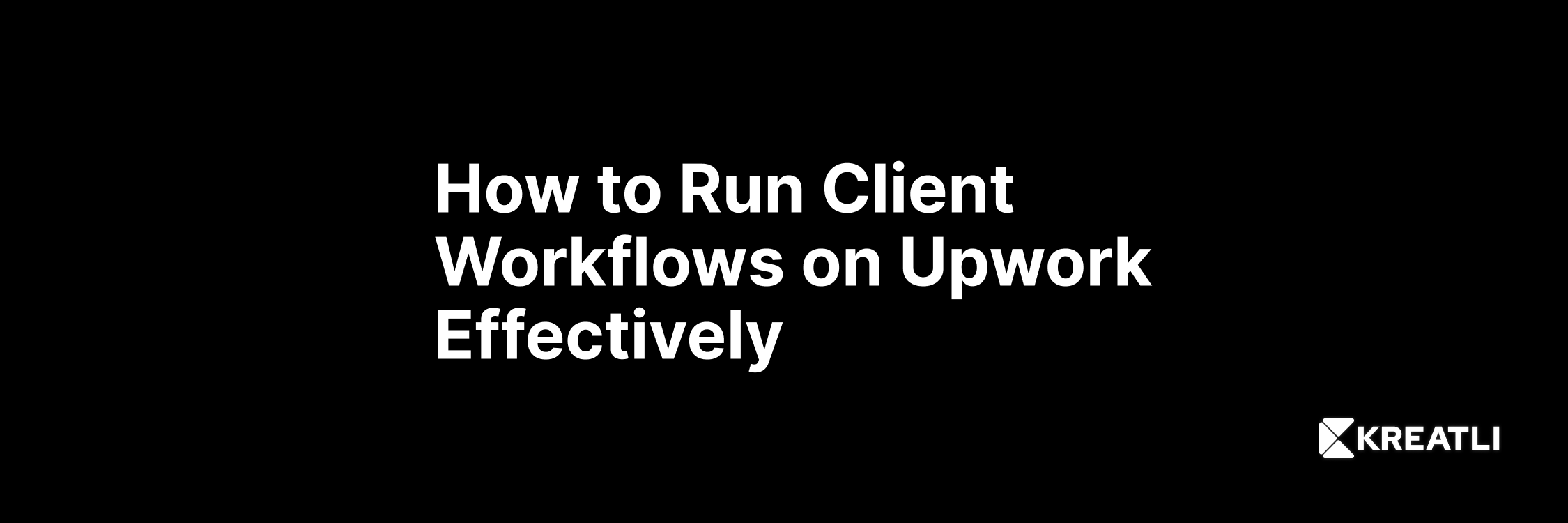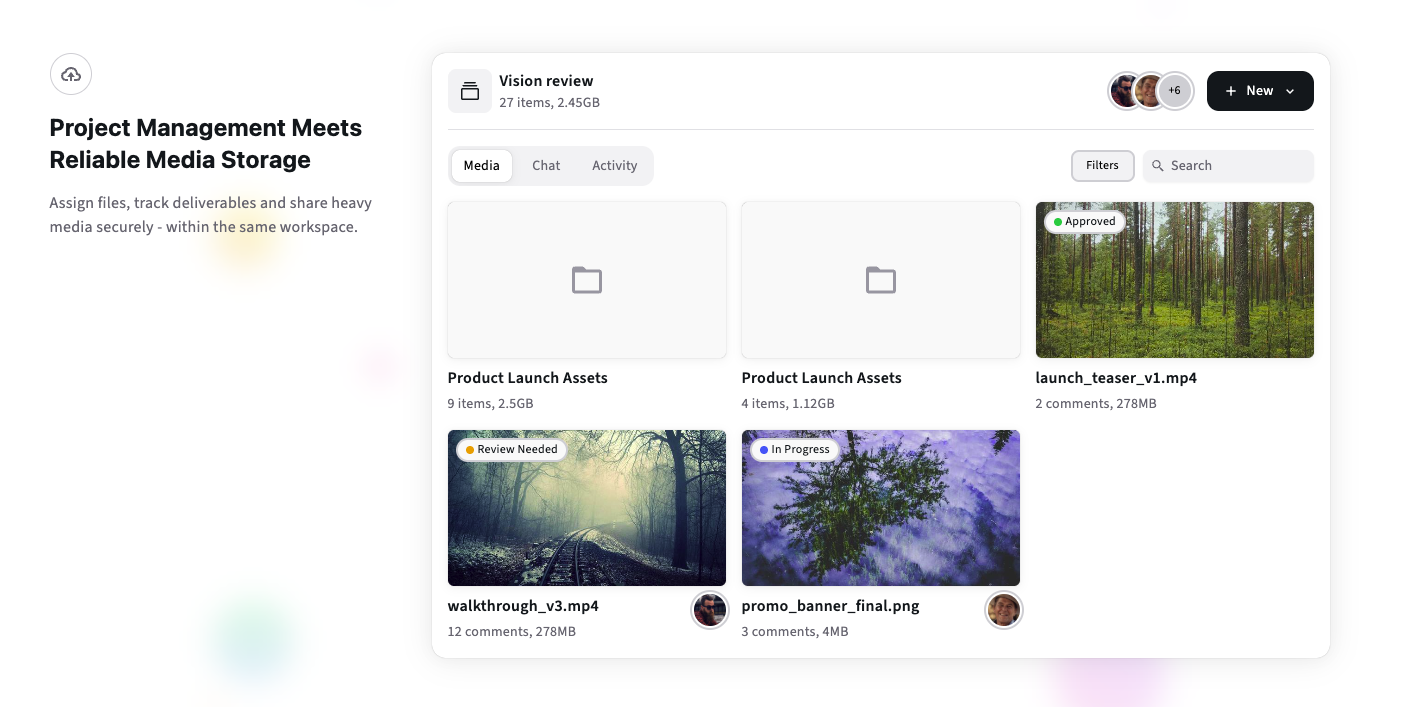Upwork Project Manager Setup: Track Jobs, Milestones, and Deliverables
Practical guide for Upwork project managers, covering contract types, milestones, work diary, delivery receipts, templates, and how to pair Upwork with a production management platform like Kreatli to keep briefs, approvals and files together.

Why treating Upwork work like a proper project pays off
Upwork is optimized for hiring and quick engagement, but many projects look like mini agency jobs. Without a repeatable project setup we see scope creep, missing assets, unclear approvals, and billing disputes. As project managers we reduce risk by standardizing intake, milestones, and delivery proofs. The combined result is faster approvals, cleaner invoices, and fewer disputes.
Step 1, choose the right contract type and understand how payments work
Upwork supports hourly contracts and fixed-price contracts with milestones. Use the model that best matches your control needs.
Hourly contracts use the Upwork Work Diary to log time and provide visibility into activity. This backs hourly payments, and Upwork’s Work Diary is the canonical record for hourly protection. Use hourly when the scope is uncertain and you want continuous tracking. Upwork Work Diary.
Fixed-price contracts let you split work into milestones. Each milestone can be funded in escrow and released when the milestone deliverable is approved. You can add, edit, and reorder milestones inside the contract workroom, which helps structure staged delivery. Use fixed-price when deliverables and acceptance criteria are clear. Upwork.
Understand the billing cadence too, especially for hourly work. Upwork’s weekly billing cycle means logged hours go into an invoice process clients review weekly, and payments clear on a schedule. Plan milestone timing and approvals with those cycles in mind.
Step 2, design milestone-based deliverables, with acceptance criteria
Milestones are the unit of delivery and payment in Upwork fixed-price contracts. Good milestones follow the INVEST pattern (independent, negotiable, valuable, estimable, small, testable), so a 4–12 week project may break into 2–6 milestones.
A robust milestone item includes:
Title - short and descriptive, e.g., "Draft edit v01, 2 minute social cut".
Deliverables - exactly what will be uploaded (filename pattern, codec, resolution).
Acceptance criteria - what constitutes "done" (for example, client signs off in writing, or fewer than two critical change items).
Due date - explicit date and time.
Payment - amount tied to the milestone, funded before work starts when possible.
Upwork supports adding and editing milestones from the contract workroom, which makes it possible to iterate if scope changes. Always require client funding of milestones where practical, this reduces disputes and aligns incentives.
Step 3, set the review window and approval action
Ambiguous sign-offs cause most disputes. Use a single, explicit approval action to close a milestone. Our standard rules:
Client has 14 days to review a fixed-price submission before funds are released automatically, use that window deliberately and communicate it.
Require time-bound reviews, typically 48 to 72 hours for drafts, and up to 14 days for final deliverables.
Define the approval action, for example the client replies “Approved” in the Upwork workroom, or clicks a documented approval button in your production management platform and confirms in Upwork messages.
Record every approval in two places, Upwork messages, and your external project record. This gives you internal audit trails and a single place to attach checksums, delivery receipts, and versions.
Step 4, use the Work Diary and evidence for hourly contracts
For hourly contracts Upwork’s Work Diary captures screenshots, activity levels, and memos. Encourage disciplined use:
Require freelancers to add memos for major tasks and partial milestones.
Ask for periodic summary notes at the end of each day or week.
Use the diary to spot unexpected downtime or unrelated activity, and raise concerns early.
The Work Diary is also the evidence that supports Upwork Hourly Payment Protection, so make sure freelancers know how to manage and annotate entries.
Step 5, transfers, proxies and delivery receipts
Large masters should not be the first thing a client downloads. Use a proxy-first approach for review, then deliver the master on final approval.
Our delivery checklist:
Upload proxy for review (H.264 720p) and provide playback link.
When client approves, deliver the master via a reliable transfer method, capture checksum (MD5 or SHA256), and paste the transfer link plus checksum into the project record and Upwork messages.
Save provider logs or receipts (for example the MASV job id, or cloud bucket copy timestamp) as proof of delivery.
Use the transfer receipt and checksum as the canonical evidence if a client claims non-delivery. Then mark the milestone as delivered in Upwork and request client approval.
Step 6, centralize your project record outside Upwork
Upwork is great for contracting and payment, but it is not a full production record. We always keep a parallel project record where briefs, proxies, delivery links, comments and final approvals live together. That is where a production management platform such as Kreatli becomes invaluable.
Why maintain a separate project record:
Upwork messages can become cluttered across many projects.
You want one place to attach timecode-pinned comments, approval receipts, and long-term metadata.
External records make it easy to reuse assets, generate invoices, and show post-project analytics.
Kreatli, described here as a production management platform, is purpose-built to hold project briefs, host proxy playback with timecode comments, store delivery proof and version history, and link up to transfer tools and archives. Use the platform to mirror milestone states, so that when a client approves in Kreatli you also update the Upwork milestone status. This dual record helps reduce disputes and speeds audits.
Templates we use, copy-paste ready
Intake template (paste into the first Upwork message)
Project name:
Objective (one sentence):
Deliverables and file specs (format, resolution, naming convention):
Milestone 1: title, deliverable, due date, payment
Milestone 2: …
Approver name and email:
Review windows: draft 48 hours, final 14 days
Transfer method for masters: MASV/Dropbox/Backblaze + checksum
Milestone submission note
Hi [Client], Milestone [X] submission is ready, link here [proxy link]. Please leave timecode comments in the player, or reply with “Approved” within 48 hours. Master will be delivered after approval.
Delivery receipt format
File name:
Transfer method: provider and job ID
Checksum (SHA256):
Delivery timestamp:
Notes: any outstanding items
Pilot plan, 30 days, validate the setup
Week 0, prepare
Create intake and milestone templates in Upwork and in Kreatli.
Configure transfer tool and create a simple automation that posts transfer receipts to the project.
Week 1, small pilot project
Run a 1–2 milestone job, require funding of the first milestone, use proxy reviews only.
Week 2, gather feedback
Track time-to-first-comment, number of revision rounds, and client onboarding time.
Week 3, iteration
Fix intake gaps, shorten review notes, add checklist reminders in Kreatli.
Week 4, run a second, slightly larger project
Confirm that approvals, checksums and receipts are being stored in both Upwork and Kreatli. If KPI targets are met, roll the workflow to the team.
KPIs to track:
Time-to-first-comment, average revision rounds per milestone, onboarding time for new clients, rate of milestone disputes.
Common pitfalls and how to avoid them
Vague milestone descriptions - avoid it with acceptance criteria and example filenames.
No funded milestone - require the client to fund the first milestone when possible. This avoids late payment risk.
Multiple review channels - consolidate on Upwork messages plus your external project record, do not permit email-only approvals.
No transfer receipts - always attach checksums and provider logs to the milestone submission.
FAQ
Q: How long does Upwork hold funds for fixed-price milestones?
A: Milestone funds are held in escrow until they are released by the client or automatically released after the review window. Check the contract workroom for the current timeline.
Q: Can a client request changes after approving a milestone?
A: Yes, but it should be treated as a change request and potentially billed as another milestone or an additional invoice. Always record the change request in Upwork messages and your external project record.
Q: How does Upwork protect clients for hourly work?
A: Upwork Hourly Payment Protection is supported by the Work Diary, which records screenshots, activity, and memos to justify billed hours. Encourage freelancers to annotate diary entries.
How you can pair Upwork with Kreatli to scale projects
Upwork handles hiring, contracts, escrow and payments, but production workflows live elsewhere. You can use Kreatli, a production management platform, to:
Host briefs and intake templates, so producers and clients see the same scope.
Host proxies and collect timecode-pinned comments.
Store transfer receipts and checksums as part of the project timeline.
Mirror milestone states so approval in Kreatli is reconciled with Upwork milestones.
This pattern reduces ambiguity and preserves a single canonical project record that helps billing, reuse and audits.
Conclusion
Upwork gives you the contracting and payments layer, but as Upwork project managers we must design the delivery layer. Use fixed-price milestones with clear acceptance criteria for predictable work, rely on the Work Diary for hourly transparency, require transfer receipts and checksums for master delivery, and keep a parallel production record so briefs, timecode comments and approvals are easy to find. Pairing Upwork with a production management platform like Kreatli makes this practical and repeatable, and reduces disputes and rework.
Can Kreatli become your Production Management Platform?
Book a free 30-minute call to help you set up your Upwork project structure in Kreatli.
